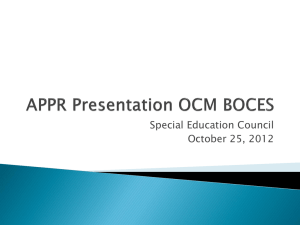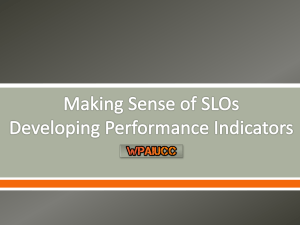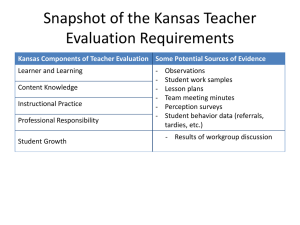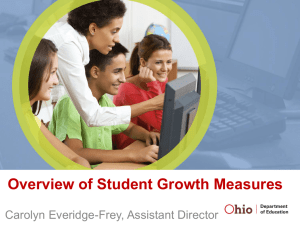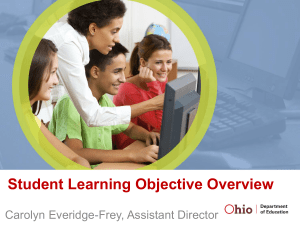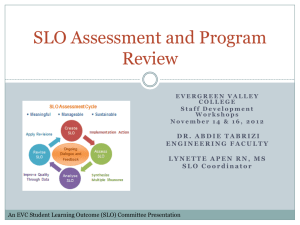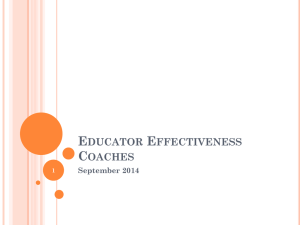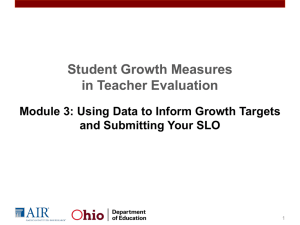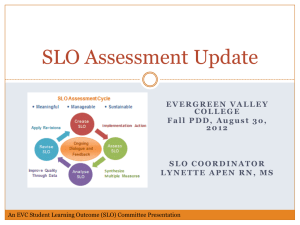How Does Student Growth Measure Teacher Effectiveness
advertisement
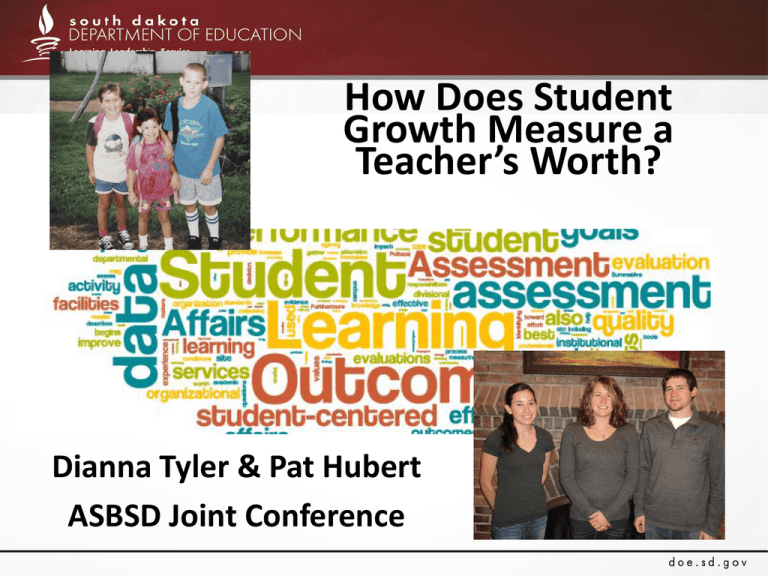
How Does Student Growth Measure a Teacher’s Worth? Dianna Tyler & Pat Hubert ASBSD Joint Conference Agenda • • • • • Introductions and welcome What is an SLO? The SLO Process Guide The SLO in Teachscape How does an SLO fit into the Teacher Effectiveness System? A Little Bit of History • South Dakota’s work to develop meaningful educator effectiveness systems is united by a common aspiration: To improve instruction and student learning. – The 2010 Teacher Standards Workgroup – Adopted Charlotte Danielson Framework for Teaching now known as The SD Framework for Teaching – The 2011-2012 Teacher Standards Pilot Districts – The 2012 Teacher Evaluation Workgroup – The SD Commission of Teaching and Learning – The 2013-2014 Teacher Effectiveness Pilot participants – The 2013-2014 Principal Effectiveness Pilot participants – The University of South Dakota More History… • Evaluations in the past in SD • Teacher evaluation and NCLB waiver • SD Teacher Effectiveness Model: 2 parts – Professional practice (SD Framework for Teaching) – Student Growth • How does it all fit together? Determining Teacher Effectiveness Using multiple measures of professional practice and student learning South Dakota Framework for Teaching Student Growth The Recommended Model! Domain 1 Domain 2 Domain 3 Domain 4 SLOs Planning and Preparation Classroom Environment Instruction Professional Responsibilities State Assessments • Classroom Observations and Evidence of Effective Practice • Components from Each of the 4 Domains (as one measure if available) District Assessments Evaluator-Approved Assessments • At Least 8 Components Chosen Based on District or School Priorities Professional Practice Rating Growth Rating Summative Rating Matrix Professional Oversight: Is the rating fair and accurate based on the evidence and data shared by the teacher Differentiated Performance Categories Below Expectations Meets Expectations Exceeds Expectations Determining Teacher Effectiveness Using multiple measures of professional practice and student learning South Dakota Framework for Teaching Student Growth Domain 1 Domain 2 Domain 3 Domain 4 SLOs Planning and Preparation Classroom Environment Instruction Professional Responsibilities State Assessments • Classroom Observations and Evidence of Effective Practice • Components from Each of the 4 Domains (as one measure if available) District Assessments Evaluator-Approved Assessments • At Least 8 Components Chosen Based on District or School Priorities Professional Practice Rating Growth Rating Summative Rating Matrix Professional Oversight: Is the rating fair and accurate based on the evidence and data shared by the teacher Differentiated Performance Categories Below Expectations Meets Expectations Exceeds Expectations Summative Scoring Matrix Summative Teacher Effectiveness Rating Categories Below Expectations Meets Expectations Exceeds Expectations Judgment Rating Subject ✪ to Review Teacher A Summative Teacher Effectiveness Rating Categories Below Expectations Meets Expectations Exceeds Expectations Judgment Rating Subject ✪ to Review Teacher B Judgment Rating Subject to Review Summative Teacher Effectiveness Rating Categories Below Expectations Meets Expectations Exceeds Expectations Judgment Rating Subject ✪ to Review Teacher C Judgment Rating Subject to Review Summative Teacher Effectiveness Rating Categories Below Expectations Meets Expectations Exceeds Expectations Judgment Rating Subject ✪ to Review Let’s Define It! Student Growth Student Learning Objective Student growth is defined as a positive change in student achievement between two or more points in time. Using a measure of student growth – as opposed to using student achievement results from a single test delivered at a single point in time – is more reflective of the impact an individual teacher has on student learning. A Student Learning Objective is a teacher-‐driven goal or set of goals that establish expectations for student academic growth over a period of time. The specific, rigorous, realistic and measurable goal(s) must be based on baseline data and represent the most important learning that needs to occur during the instructional period. SLOs are aligned to applicable Common Core, state or national standards. How many SLOs? A minimum of 1 SLO per teacher is required. • Teachers can write more, but only one is required by the state and used for evaluation purposes. • Districts may require more than one SLO. Sample Growth Goal For the 2014-15 school year, 90% of my students will pass the end of the year teacher created Civics assessment with a score of 70% or better. This example is the end result of working through the SLO development. Oops… The SLO Process SLO Development SLO Approval Prioritize Learning Content What do I want my students to be able to know and do? Analyze data and develop baselines Where are my students starting? Ongoing Communication Select or develop an assessment Prepare for Summative Write growth goal What assessments are available? What can I expect my students to achieve? Process Time line SLO SLO Approval Development Fall Aug.-Oct Progress Update End of SLO year/semest er mtg with evaluator Step 1 SLO Development SLO Approval Prioritize Learning Content What do I want my students to be able to know and do? Analyze data and develop baselines Where are my students starting? Ongoing Communication Select or develop an assessment Prepare for Summative Write growth goal What assessments are available? What can I expect my students to achieve? Step 2 SLO Development SLO Approval Prioritize Learning Content What do I want my students to be able to know and do? Analyze data and develop baselines Where are my students starting? Ongoing Communication Select or develop an assessment Prepare for Summative Write growth goal What assessments are available? What can I expect my students to achieve? Step 3 SLO Development SLO Approval Prioritize Learning Content What do I want my students to be able to know and do? Analyze data and develop baselines Where are my students starting? Ongoing Communication Select or develop an assessment Prepare for Summative Write growth goal What assessments are available? What can I expect my students to achieve? 3. Ongoing Communication • Describe student progress toward the growth goal. • If necessary, document changes in strategy. • If justified*, describe changes to the SLO Justified Examples* • A teacher’s roster changes drastically due to high student mobility rates. • A teacher’s assignment changes significantly over the course of the year. • A teacher serves as a pull-in/push-out teacher or co-teaches. • Long-term leave Step 4 SLO Development SLO Approval Prioritize Learning Content What do I want my students to be able to know and do? Analyze data and develop baselines Where are my students starting? Ongoing Communication Select or develop an assessment Prepare for Summative Write growth goal What assessments are available? What can I expect my students to achieve? UNDERSTANDING THE SLO PROCESS GUIDE SLO Process Guide Teachscape On-Line Teach two subjects? • If you teach two (or more) subjects go with the tested subject! Less Common More Common “More Common” = More Widely Used STATE MANDATED ASSESSMENTS This category includes assessments mandated for use statewide and includes assessments required by state and federal law. Examples: Smarter Balanced Assessment, Dakota Step Science Assessment (or the staterequired science assessment) COMMON STATE AND DISTRICT ASSESSMENTS This category includes assessments not mandated for state use but are widely used by several districts and schools. Assessments in this category include commercially available assessments, district-developed pre- and post-tests or course-level assessments. Assessments could also take the form of established rubric-scored performance-based assessments. Examples: Assessments available through the South Dakota Assessment Portal, End-ofCourse Exams, Write-to-Learn, WIDA-Access Placement Test (English-Language learners), National Career Readiness Certificate, DIBELS, AP Exams, STARS reading/math, MAPS, AIMS Web, CTE Performance Contests/Judging. TEACHER-DEVELOPED ASSESSMENTS This category of assessments includes classroom assessments used by a single course for a particular teacher. The SMART Process A Format for Developing SLOs S M A R T Specific Measurable Appropriate Realistic & Rigorous Time-bound The goal addresses student needs within the content. An appropriate instrument or measure is selected to assess the goal. The goal is standardsbased, needsfocused (and directly addresses all students) The goal is attainable and stretches student learning. The goal is contained to a single school year/course. Growth Goals Based on quality baseline data and educatordetermined definition of mastery. Goal is structured based on percent of students attaining mastery. Class Mastery Establishes tiered expectations for student growth for groups of students. The educators define what growth looks like for each group of students. Differentiate d Growth Teams of teachers agree to work collaboratively and share responsibility/accountability for student learning for a content area, grade level or school. Shared Performanc e Teacher Student Growth Rating PERFORMANCE CATEGORY DESCRIPTION Low Less than 65% goal attainment Expected 65% to 85% goal attainment High 86% to 100% percent attainment Scores for 80% Goal • Sample SLO: At the end of the term, all students will show measurable progress in HS Chemistry as shown by the American Chemical Society National High School Final Exam. 80% of all students will obtain a score of 26 or better on the exam. (26 is considered average). Low Less than 65% goal attainment (.80 x .65 = Less than 52%) Expected 65% to 85% goal attainment (.80 x .65 = 53%) (.80 x .85 = 68%) High 86% to 100% percent attainment (.80 x .86 = 69%) (.80 x 100 = 80%) Scores for 70% Goal • Sample SLO: At the end of the term, all students will show measurable progress in HS Chemistry as shown by the American Chemical Society National High School Final Exam. 70% of all students will obtain a score of 26 or better on the exam. (26 is considered average). Low Less than 65% goal attainment (Less than 46%) Expected 65% to 85% goal attainment (46% - 59%) High 86% to 100% percent attainment (60% - 70%) Step 4 For the 2014-15 school year, 90% of my students will pass the end of the year teacher created Civics assessment with a score of 70% or better. High growth is 86-100% of your goal Expected growth is 65 – 85% Low growth is less than 65% Figure where your scores must be according to your growth goal. Step 4 For the 2014-15 school year, 90% of my students will pass the end of the year teacher created Civics assessment with a score of 70% or better. High growth is 86-100% of your goal 77% - 90% Expected growth is 65 – 85% 59% - 77% Figure where your scores must be according to your growth goal. Low growth is less than 65% Less than 59% Principal Student Growth Rating PERFORMANCE CATEGORY DESCRIPTION Low Less than 80% of teachers earned expected growth Expected 80-90% of teachers earned expected growth High 91-100% of teachers earned expected growth How has DOE helped? • SLO Trainings in March for Administrators • SLO Trainings this summer for 5900 teachers this summer in many locations around the state. • On going support and coaching this school year. • This is the practice year. • Reflect Best Practice • Flexible • Timeline, amount of growth, type, assessment • Between Teacher and Evaluator • Collaborative • Focused Questions CLOSURE Dianna Tyler and Pat Hubert ESA2
